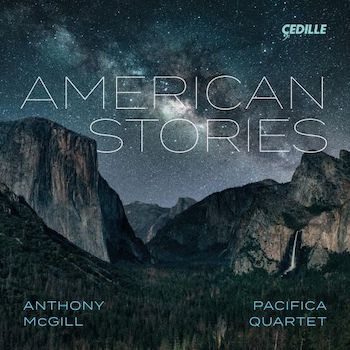Classical Album review: Clarinetist Anthony McGill’s “American Stories”
By Jonathan Blumhofer
These stories occupy their own, distinctive spaces but they share something intangible. A kind of humanity, maybe? Perhaps.
 The 1963 Birmingham Church Bombing. The legacy of indigenous Americans. A reflection on the natural wonders of northern New Mexico. Mohammed Ali. Those are the departure points for American Stories, the latest album from clarinetist Anthony McGill, who’s joined on this occasion by the Pacifica Quartet.
The 1963 Birmingham Church Bombing. The legacy of indigenous Americans. A reflection on the natural wonders of northern New Mexico. Mohammed Ali. Those are the departure points for American Stories, the latest album from clarinetist Anthony McGill, who’s joined on this occasion by the Pacifica Quartet.
In a liner note, McGill discusses the importance of narratives to cultivating relationships; ultimately, he offers, they point to a “shared humanity.” That’s a hard point with which to argue and it surely won’t escape any listener’s notice that all four composers represented here – Richard Danielpour, James Lee III, Ben Shirley, and Valerie Coleman – write in idioms that are clearly dramatic and broadly accessible.
Danielpour’s Four Angels offers a reflection on the continuing Civil Rights struggle. By turns lyrical, hymn-like, and violent, this quarter-hour-long score provides moments of real intensity – particularly during the searching middle section, with its dialogues between clarinet and strings and pungent climaxes – but no easy answers.
Despite a darkly songful slow movement, Lee’s Quintet for Clarinet and Strings is generally energetic and limber. Some spots (check out the second movement, “Awoshowa,” with its evocation of a Native American pow-wow) are downright playful. Throughout, the music – which occasionally sounds like a collision between Prokofiev and Dvorak – is colorful and shapely.
So is Shirley’s High Sierra Sonata, which mixes extended and standard techniques with a kind of rollicking, dancing impetus. While the effort thrives on big contrasts of character (especially in the opening “Buttermilk Morning”), Shirley’s writing is fundamentally songful and shot through with a subtle but strong use of arch form.
Meanwhile, Coleman’s Shotgun Houses presents Ali as a product of his time and place (namely, the West Louisville neighborhood of his childhood). The composer is no stranger to vigorous, florid woodwind writing (she’s an accomplished flutist, after all) and she gives McGill plenty to do: lively dialogues between clarinet and strings in the opening “ShotGun Houses” and smoothly flowing licks in the concluding “Rome 1960,” among them.
As in the other three works, McGill and Friends handle everything that’s thrown at them with aplomb. To be sure, there are moments in each piece that seem to overstay their welcomes. And none of them break any new ground.
But such is the stylistic variety between these composers and the quality of their writing that the ear is never bored or offended. These stories occupy their own, distinctive spaces but they share something intangible. A kind of humanity, maybe? Perhaps.
Jonathan Blumhofer is a composer and violist who has been active in the greater Boston area since 2004. His music has received numerous awards and been performed by various ensembles, including the American Composers Orchestra, Kiev Philharmonic, Camerata Chicago, Xanthos Ensemble, and Juventas New Music Group. Since receiving his doctorate from Boston University in 2010, Jon has taught at Clark University, Worcester Polytechnic Institute, and online for the University of Phoenix, in addition to writing music criticism for the Worcester Telegram & Gazette.

